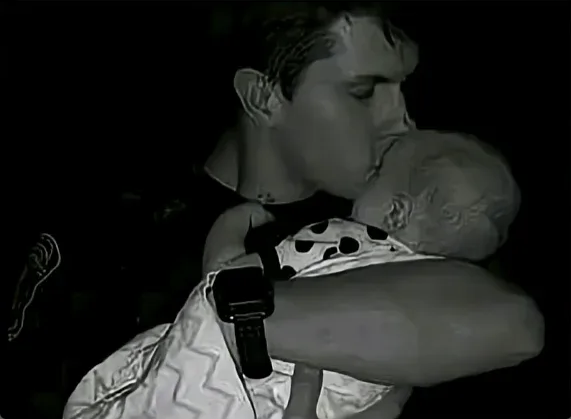
He married a police officer’s daughter and now understands why people say her posts are “too much.”
Every night, he watches her pray, and every phone ring makes her freeze with fear. When another officer doesn’t come home, she sheds silent tears on the living room floor.
Being a police officer is hard, but being the family waiting is its own sacrifice. Every morning, she kisses him goodbye, never knowing if it will be the last time.
Behind every badge is a father, mother, husband, or wife. Her words aren’t for attention—they’re reminders that respect and gratitude should never be too much.
“He married a police officer’s daughter.” That detail is crucial. This isn’t abstract support for law enforcement—this is someone who married into a police family, who watches firsthand what police spouses experience, who now understands from inside the family what civilians never see.
“And now understands why people say her posts are ‘too much.'” Police spouses often post about the dangers their partners face, the gratitude they need, the fear they live with. And people respond: “too much,” “too dramatic,” “not every cop is a hero,” “stop making everything about police.” This husband now understands why his wife posts despite those criticisms.
“Every night, he watches her pray.” Not occasionally when something specific happens. Every night. Because every shift could be the one that doesn’t end with her husband coming home. Every night includes prayer because every night she sends him into danger and prays he returns.
“And every phone ring makes her freeze with fear.” Most people: phone rings, they answer casually. Police spouses: phone rings unexpectedly, especially during shift, and their stomach drops. Is it him calling to say he’s okay? Is it the department calling to say something happened? Every unexpected ring carries that fear.
“When another officer doesn’t come home, she sheds silent tears on the living room floor.” When officers are killed in the line of duty, it’s not abstract for police families. It’s visceral reminder that the same could happen to their spouse. She cries on the living room floor—not dramatically in public, but privately processing the terror that it could have been her husband.
“Being a police officer is hard, but being the family waiting is its own sacrifice.” Society acknowledges police work is dangerous. But police spouses sacrifice too—living with constant fear, raising children while worrying if Daddy will come home, managing household while trying to support spouse dealing with trauma they can’t discuss, watching news of officer deaths and seeing their own future.
“Every morning, she kisses him goodbye, never knowing if it will be the last time.” That’s not hyperbole. Line-of-duty deaths happen. Traffic stops go wrong. Domestic calls turn violent. Routine shifts end with officers dead. So every goodbye kiss carries weight most spouses never experience—the knowledge that this could genuinely be the last time.
“Behind every badge is a father, mother, husband, or wife.” Officers aren’t just law enforcement. They’re parents, spouses, children. They have families who love them, need them, wait for them. That badge represents someone’s whole world, and when officers die, families are devastated.
“Her words aren’t for attention—they’re reminders that respect and gratitude should never be too much.” That sentence directly addresses criticism. She’s not posting for attention or sympathy. She’s reminding people that officers risk their lives daily, that families sacrifice constantly, that expressing gratitude and respect should be welcomed, not dismissed as “too much.”
The photo shows a police officer holding his infant child, the baby sleeping peacefully against his uniform. It’s tender, intimate—father and child, the officer’s protective embrace, the absolute trust of sleeping infant. This is who’s behind the badge. This is who doesn’t come home when line-of-duty deaths occur. This is what families lose.
This story matters because police spouse experience is often invisible. Society debates police policy, officer conduct, department budgets. But police spouses just try to survive the fear—every shift wondering if their spouse will return, every phone ring bringing terror, every officer death hitting too close to home.
It challenges the “too much” criticism. When police spouses post about their fear, their pride, their need for community support—some people respond negatively. This husband is explaining: it’s not too much. It’s honest description of what police families live with. If it makes you uncomfortable, maybe that discomfort is warranted rather than the posts being excessive.
And it reminds us that law enforcement debates aren’t abstract for families. Policy discussions about police funding, training, equipment directly affect whether officers come home safely. When people criticize police broadly, families hear threats against their loved ones. When officers are killed, families experience devastating loss. Behind every badge is family praying for safe return.
She posts about her fears, her pride, her need for respect and gratitude. People say it’s “too much.” Her husband now understands: it’s exactly right. Because every night she prays, every phone ring freezes her with fear, every morning she kisses him goodbye possibly for the last time. Her posts aren’t too much. They’re reminders that respect and gratitude for people who risk their lives should never be considered excessive.